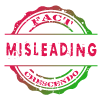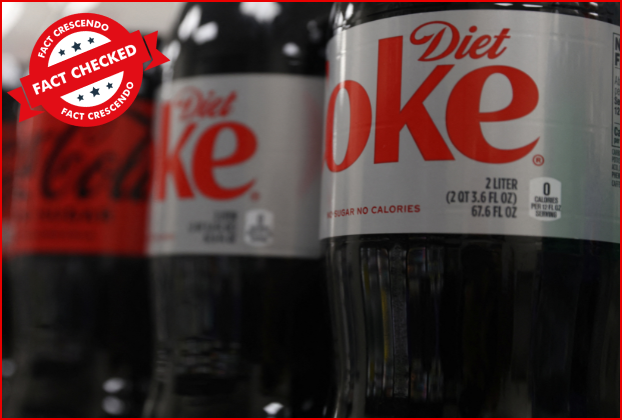Recent concerns have re-emerged about the potential cancer risks associated with Coca-Cola Zero, primarily due to its use of aspartame, a commonly used artificial sweetener. The International Agency for Research on Cancer (IARC), an agency under the World Health Organization (WHO), classified Aspartame as possibly carcinogenic to humans (Group 2B), which sparked public debate and raised questions about the safety of beverages containing aspartame.
However, this assessment result in July 2023 was based on limited evidence and has not resulted in any of the global food safety authorities changing the acceptable daily intake of aspartame, which has remained at 50 or 40 mg/kg body weight for nearly four decades.
In this context, we explored the WHO classifications and the claims made in viral posts.
Social Media Posts
We recently discovered a claim circulating on social media platforms, including Facebook and Instagram, complaining that Coca-Cola Zero, the popular soft drink, has the potential to cause cancer.
Below is another claim with the same message.
We decided to conduct an investigation to gather more information and gain a deeper understanding of the matter.
Fact Check
Aspartame, scientifically known as methyl L-α-aspartyl-L-phenylalaninate (The systematic IUPAC name is (3S)-3-amino-4-[(2S)-1-methoxy-1-oxo-3-phenylpropan-2-yl] amino-4-oxobutanoic acid, Molecular Formula is C₁₄H₁₈N₂O₅) , is an artificial non-saccharide sweetener used as a sugar substitute in various foods and beverages. It is a methyl ester of the dipeptide composed of the amino acids aspartic acid and phenylalanine.
What is the main difference between Aspartame and Glucose?
Aspartame is approximately 200 times sweeter than sucrose (table sugar). It is commonly known under brand names such as NutraSweet, Equal, and Canderel. Aspartame is a sugar alternative in many foods and drinks, offering low—or no-sugar and calorie options.
Therefore, aspartame and glucose are two completely different chemicals. Glucose is one of the simplest carbohydrates; the body quickly converts it to energy. It has a sweet taste. Aspartame is a chemical that our tongues interpret as sweet, but our bodies cannot convert it to energy.
Aspartame is chemically unstable at high temperatures, leading to decomposition. It decomposes into methanol and phenylalanine. Methanol can further degrade into formaldehyde, which is a potent carcinogen.
Degradation of Aspartame. Source: IARC Monographs on the Identification of Carcinogenic Hazards to Humans
Studies on Aspartame Being Carcinogenic
Samar Y. Ahmad and his research team report that aspartame is quickly hydrolysed in the small intestine by digestive enzymes, breaking it down into methanol, phenylalanine, aspartic acid, and further metabolites, such as formaldehyde (a carcinogen) and formic acid. Despite this, due to its rapid and complete metabolism, aspartame is not detected in circulating blood, even after ingesting high doses exceeding 200 mg/kg. Read the full report here.
Artificially sweetened soda is associated with increased liver cancer risk among persons with diabetes. Read the full research here. Also, studies in mice and rats who ate food with aspartame also found increased tumour rates. Read the full research here.
A study conducted by Sharon Parten Fowler and his research team at The University of Texas Health Science Center at San Antonio (UT Health San Antonio) suggests a potential link between autism diagnosis in boys and their mothers’ consumption of diet soda or aspartame during pregnancy or breastfeeding. The study discovered that boys diagnosed with autism were more than three times as likely to have mothers who consumed one or more servings of diet soda or equivalent amounts of aspartame daily during pregnancy or breastfeeding compared to neurotypically developing boys. No statistically significant association was found in female offspring. Read the full research here.
Research continues to explore the long-term effects of aspartame and other artificial sweeteners. The current body of evidence does not support the claim that aspartame is carcinogenic to humans when consumed within established safety limits.
Coca-Cola’s Response
“Aspartame is a sugar alternative used in many of our products to provide options with reduced, low, or no sugar and calories. We include aspartame in some of our beverages because we know many people want to choose great-tasting drinks with fewer calories.”
“Science and health professional organisations have affirmed sugar substitutes, like aspartame, are safe. So have food safety authorities, like the U.S. Food and Drug Administration (FDA).”
However, individuals with the rare hereditary disorder phenylketonuria (PKU) should strictly limit their intake of phenylalanine, a component of aspartame. Coca-Cola stated that for this reason, they clearly label their bottles and cans to indicate the presence of phenylalanine. Some of our popular drinks sweetened with aspartame include Coke Zero Sugar, Diet Barq’s, Diet Coke, Diet Coke Feisty Cherry, Fanta Zero, Fresca, Gold Peak Diet Tea, Mello Yello Zero, Minute Maid Light, Pibb Zero, Seagram’s Ginger Ale Zero Sugar, and Sprite Zero.
The website states that the Coca-Cola Classic taste is not sweetened with aspartame but rather with high fructose corn syrup or cane sugar, depending on your location.
Regarding Sprite, the regular version does not contain aspartame, but Sprite Zero in the U.S. is sweetened with a blend of aspartame and Ace-K to offer a crisp, clean taste with reduced or no calories.
Coca-Cola stresses the safety of aspartame, as it is a key ingredient in many of its products; it closely monitors all research on it, stating that experts, including those from the American Cancer Society, have consistently found aspartame safe for consumption.
Globally recognised authorities, including the FAO/WHO Joint Expert Committee on Food Additives (JECFA), the US Food and Drug Administration (FDA), and the European Food Safety Authority (EFSA), have confirmed its safety.” Source: The Coca-Cola Company, 2024
Implications of World Health Organization’s classification on Aspartame!
IARC Monographs on the Identification of Carcinogenic Hazards to Humans (2024) conclude that there is limited evidence in humans for the carcinogenicity of aspartame. However, positive associations have been observed between aspartame and cancer of the liver (hepatocellular carcinoma). Read the full report here.
Therefore, citing “limited evidence” for carcinogenicity in humans, the International Agency for Research on Cancer (IARC) classified aspartame as possibly carcinogenic to humans (IARC Group 2B), and the Joint Expert Committee on Food Additives (JECFA) reaffirmed the acceptable daily intake of 40 mg/kg body weight.
What does Group 2B – Possibly carcinogenic to humans mean?
Group 2B is classified as “possibly carcinogenic to humans,” meaning that there is some evidence that it can cause cancer in humans. However, this classification is far from conclusive and has many limitations. Some of the items listed under this category might not have any direct evidence of their cancer-causing properties in humans.

There are over 321 agents classified by the IARC Monographs, which fall under Group 2B.
Foods that contain aspartame
Aspartame is commonly used in “sugar-free” or “diet” foods and beverages, such as baked goods, soft drinks, powdered drink mixes, candy, puddings, canned foods, jams and jellies, and dairy products. Consumers can identify if a product contains aspartame by checking the ingredient list on the label, where it may be listed as E951, the European food code for aspartame. You can check if your favourite snack contains aspartame here.
FDA has not changed its regulations for Aspartame as per WHO’s latest classifications
However, The FDA disagrees with the IARC’s conclusion that aspartame should be classified as a possible human carcinogen. FDA scientists reviewed the scientific information included in IARC’s 2021 review and identified significant shortcomings in the studies on which IARC relied. The JECFA did not raise safety concerns for aspartame at current usage levels and did not change the Acceptable Daily Intake (ADI).
The FDA further concludes that aspartame is one of the most extensively studied food additives in the human food supply. FDA scientists do not have safety concerns when aspartame is used under approved conditions. The sweetener is approved in many countries, and regulatory and scientific authorities, such as Health Canada and the European Food Safety Authority, have evaluated it and considered it safe at currently permitted use levels.
What the WHO and IARC said: taking into perspective
The classification of aspartame as “possibly carcinogenic to humans” indicates there is some evidence suggesting a potential link between aspartame and cancer, but this evidence is not conclusive. This classification does not imply that aspartame will definitely cause cancer. See the health expert opinions here and here.
Further, this classification applies to various substances and foods, with over 321 items currently categorised in this way. This does not mean that these substances, including aspartame, are confirmed to cause cancer, but rather that there is some evidence that warrants further investigation.
Even after July 2023, the most recent classification of the 2B category, the Joint FAO/WHO Expert Committee on Food Additives (JECFA) concluded that the data evaluated indicated no sufficient reason to change the previously established acceptable daily intake (ADI) of 0–40 mg/kg body weight for aspartame.
For example, a can of diet soft drink containing 200 or 300 mg of aspartame would require an adult weighing 70kg to consume more than 9–14 cans per day to exceed the acceptable daily intake, assuming no other intake from other food sources.
Sri Lankan Context and Views from a Nutrition Expert on Aspartame
Professor Ananda Chandrasekara, from the Department of Applied Nutrition, Wayamba University of Sri Lanka, said the term “positive associations between aspartame and cancer” does not mean that aspartame causes cancer but that there is a potential risk. Therefore, we cannot completely discourage the consumption of aspartame, especially since many Sri Lankans suffer from chemophobia. However, it is important to advise against heavy consumption. Regular or high doses of aspartame may increase the risk of cancer, so moderation is key.
The Sri Lankan government regulates the consumption of artificial sweeteners, including aspartame, under the FOOD ACT, No. 26 OF 1980. According to this act, no person shall use any sweetener in or on any food prepared explicitly for infants or young children.
For this regulation, the quantity of each sweetener present in such food shall be expressed as a percentage of the maximum allowable amount of the appropriate sweetener. Read more Food (Sweeteners) Regulations 2014
Possible negative impacts of Artificial Sweeteners
In addition to aspartame, several other artificial sweeteners are approved by the FDA, including Acesulfame potassium (Ace-K, E950), Neotame (E961), Saccharin (E954), and Sucralose (E955). You can view a comprehensive list of FDA-approved artificial sweeteners here.
Unfortunately, some research indicates that these artificial sweeteners can have a detrimental impact on your health.
Artificial sweeteners can cross the blood-brain barrier and disrupt hippocampal function. This disruption impairs sensitivity to interoceptive signals, deregulates appetitive behaviour, and thereby promotes increased food intake. Read more here and here.
Some studies have demonstrated that artificial sweeteners can disrupt normal gut microbiota, potentially leading to obesity and metabolic syndrome. This disruption is also associated with impaired glucose tolerance, which can raise blood sugar levels and increase the risk of diabetes. For complete research papers, read here and here.
Conclusion
The debate surrounding the safety of aspartame, particularly in popular beverages like Coca-Cola, reflects broader concerns about food additives and their potential health implications. While organisations such as the International Agency for Research on Cancer (IARC) have classified aspartame as possibly carcinogenic based on limited evidence, regulatory authorities like the FDA and JECFA maintain that it is safe for consumption at established levels. The FDA has identified significant shortcomings in the studies cited by IARC and emphasises that aspartame has undergone extensive safety evaluation.
Furthermore, the Sri Lankan government has implemented regulations to control the use of artificial sweeteners, ensuring that they are not included in foods specifically prepared for infants and young children. This highlights the importance of monitoring and regulating food additives to protect vulnerable populations.
As consumers navigate the complexities of food safety, it is crucial to rely on scientific evidence and regulatory guidance while remaining mindful of moderation in consumption. Ongoing research and transparent communication from food manufacturers are vital to addressing public concerns and ensuring consumer safety in the evolving landscape of food additives.

Title:No Evidence suggests that an average user should be worried about Diet Coca-Cola being Carcinogenic!
Fact Check By: Fact Crescendo TeamResult: Misleading






